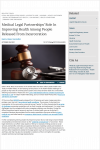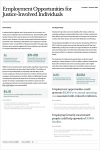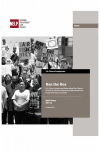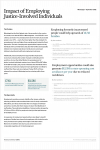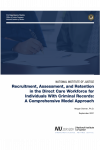Resources
"Search Results" - 163 item(s) found.
-
Collateral Consequences Resource Center
(November 2021)At this Georgetown on the Hill event, a panel of experts discuss the economic and social impact of challenges individuals with a criminal history face in establishing and growing a new business. Panelists consider the issues that arose when the policies were applied to pandemic relief funds; the possible correlation between criminal ... -
CSG Justice Center
(November 2021)As states across the nation struggle with labor shortages, The Council of State Governments Justice Center launched the Fair Chance Licensing Project, an unprecedented effort to track new reforms across all 50 states that reduce barriers to employment for people with criminal and juvenile records. The project also provides resources for lawmakers, business leaders, ... -
David L. Rosen, Evan Ashkin, Health Affairs
(October 2021)In this brief, the authors explain how collateral consequences of conviction and other legal issues can be viewed as a manifestation of social determinants that can be detrimental to health. They characterize the burden of such legal challenges among a population of released persons with chronic health conditions; describe the structure ... -
Recidiviz and Right on Crime
(October 2021)Louisiana has the highest rate of incarceration in the country. As a result, 1 in 3 Louisianans have a criminal record – approximately 1.5 million people. While analysis found that 93.3% of individuals between 25 and 44 years old who were formerly incarcerated were employed or actively looking for work, prior ... -
Beth Avery, Han Lu, National Employment Law Project
(October 2021)As this guide discusses, 37 states and over 150 cities and counties nationwide have adopted what is widely known as “ban the box” so that employers consider a job candidate’s qualifications first—without the stigma of a conviction or arrest record. Borne out of the work of All of Us or None, ... -
Recidiviz and Right on Crime
(September 2021)Mississippi has the third highest rate of incarceration in the country. As a result, more than 10.55% of Mississippians – over 235,152 – have a felony conviction. The unemployment rate for formerly incarcerated people is over 27%—nearly five times higher than the standard U.S. unemployment rate, and higher than unemployment during the Great Depression. The lack of ... -
National Institute of Justice
(September 2021)As this report discusses, demographic shifts in the U.S. are creating a heightened need for direct care workers. The U.S. Bureau of Labor Statistics predicts home health aides and personal care aides will continue to be among the fastest-growing occupations. The author cites that researchers estimate there will be over ... -
Institute for Justice
(August 2021)As the Institute for Justice states, while a job is one of the best ways for people with criminal records not to re-offend, many occupational licensing laws block or burden ex-offenders. According to the Institute, many licensing laws have morality clauses that (1) bar automatically and permanently ex-offenders from working ...


